Climate-Wise Community Planning
La Plata County, Colorado
Federal Funding: $500,000
Project Timeline: April 2011 – December 2014
- Project Summary
- Community Characteristics
- Results
- Lessons Learned
- Sustainability/Replication
- Project Websites
- Photos
Project Summary
The La Plata County Climate-Wise Community Program consisted of four distinct project areas:
- Climate-Informed Mileage Reduction,
- Climate Education: Portable Planet and Resource Smart Design,
- Climate-Friendly Local Food System, and
- the Resource Smart Business Program (RSBP).
This comprehensive program was an extension of the community’s Climate and Energy Action Plan (CEAP). Each portion of the program is summarized below, while the results are presented as a total for the whole program.
Under the Climate-Informed Mileage Reduction segment of the program, La Plata County aimed to increase bus ridership by 125% between 2011 and 2014 through rider outreach and incentives, and by upgrading transit buses with attractive amenities, such as wireless internet service and reading lights to encourage ridership. While the project was unable to find a vendor for the Wi-Fi system, transit ridership increased in a number of participating areas.
La Plata County also partnered with Durango Discovery Museum to educate children and youth on energy efficiency. The museum purchased a state-of-the-art, interactive multimedia earth globe called Portable Planet and developed a comprehensive, interactive climate change program for kindergarten through 8th graders using a NASA-based curriculum and Portable Planet technology. The Museum also developed a building science-based curriculum and program, designed to create hands-on resource smart building design and engineering education opportunities.
Another element of the Climate Education program was the “Solar Roller”—a mobile science discovery center that housed hands-on exhibits, an infrared camera, and a PV solar panel exhibit. The Solar Roller sparked interest in field trips to the museum, especially for rural schools that did not have the funding to hire a school bus and transport children to and from the Discovery Museum. In response, program organizers initiated a school bus voucher program. With the help of the voucher program, schools that did not have access to the museum before were able to bring students on an educational field trip. The CSC grant was instrumental in starting the field trip program at the Discovery Museum.
Under the Climate-Friendly Local Food System segment of the program, La Plata County partnered with Healthy Community Food Systems to recruit and inform food producers, marketers, and consumers about the impact of the food choices they make, including the way food is grown, harvested, processed, stored, transported, marketed, and consumed. This three-year effort aimed to reduce the distance food travels to market, while improving the environment, local economy, and community health. This climate-informed local food system worked to help build capacity within local government, institutions, businesses, and organizations to address GHG emissions and to help forge partnerships between diverse stakeholder groups (consumers, producers, processors, restaurants, retailers, institutions, organizations, and policy-makers) for greater community and environmental benefit.
Finally, La Plata County partnered with several entities to help businesses lower GHG emissions, increase the health of their employees, and foster economic connections in La Plata County. The project provided businesses with:
- an employee health, energy usage, and sustainability audit,
- recommended measures with associated return on investment (ROI),
- a list of local reputable contractors,
- educational sessions and materials for employees,
- rebates for implementing high-cost measures, and
- recognition and marketing materials for the businesses to promote themselves as “Resource Smart”
All Climate-Wise projects were integrated and marketed as one comprehensive program to ensure consistent community-wide messages. The Climate-Wise Community Program provided numerous co-benefits, including cleaner air, reduced highway congestion, affordable access to jobs, increased spending in the local economy, improved nutrition and health, and healthier workplaces.
Community Characteristics
Population: 49,678
Area: 1,692 square miles
Government Type: County
Community Type: Rural
Median household income: $53,713
Results
|
Final Results |
Projected Cumulative Results |
|
|---|---|---|
|
Annual GHG Reductions |
3,495 mt CO2e |
5,847 mt CO2e |
|
Annual Vehicle Miles Traveled Reduction |
56,308 miles |
330,000 miles |
|
Annual Electricity Reductions |
479 MWh |
59 MWh |
|
Green Jobs Created |
6 |
6.5 |
Lessons Learned
Climate-Informed Mileage Reduction
- It was impossible to find a vendor to supply wifi service on the transit buses.
Climate Education: Magic Planet and Resource Smart Design
- As a new museum, the project implementation team found it was easy to underestimate the time, materials and expertise needed to create successful exhibits.
Climate-Friendly Local Food System
- There was resistance to this project from members of the agricultural community, so the team emphasized local food purchases over changes in agricultural practices themselves.
- The team found that promoting the non-climate benefits of local food purchases, such as boosting the local economy, was more persuasive than focusing solely on the climate benefits.
Resource Smart Business Program
- The program found it necessary to clearly define partner roles and expectations early on.
- Maintaining clear communication with partners was important. To achieve this, the program implementation team held regular partner meetings and distributed meeting notes to all partners. Regular email communication between meetings was also critical to maintaining engagement and commitment to the program.
Sustainability/Replication
- The CSC grant led to the creation of field trip labs and tours, Solar Roller and Portable Planet lessons, stage demonstrations and camp lessons that will be used at the museum for years to come. The climate zone exhibit and interactive kiosk remain in the museum and continue to serve visitors.
- The museum presented the CSC project at the Association of Science and Technology Center’s (ASTC) annual conference in October 2013. Many institutions were interested in implementing the Net Zero Camp (or at least several lessons from the camp). The Curriculab was shared with 46 educators from different institutions and the team has since fielded several calls pertaining to the lessons.
- The Climate-Friendly Local Food System was able to share nearly all of the resources developed in this project with neighboring communities, and with partners in the Southwest Marketing Network (SWMN) operating in AZ, CO, NM, WY, and UT. This project included significant outreach and assistance to Native American communities on the Colorado Plateau.
- The “Connecting the Dots…” report was designed to help other communities gain insights for developing similar efforts in their communities and has been distributed widely.
- A business plan and fee-for-service model has been developed to continue the Resource Smart Business Program in the community post-CSC grant funding. The team held a facilitated partner retreat, conducted a SWOT analysis and hosted a mini-summit with local business stakeholders to explore creative partnership opportunities.
- All materials created through the grant project are available for other communities to use and adapt for their purposes. The team created an internal process plan that outlines exactly how to implement the program.
Project Websites
Durango Discovery Museum Camp Discovery Exit
Healthy Community Food Systems website Exit
Resource Smart Business Program Exit
Photos
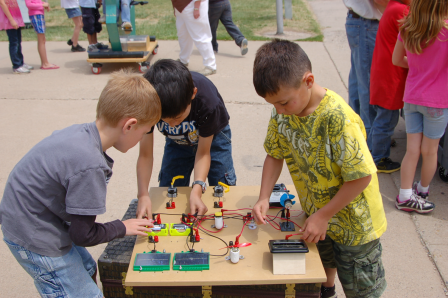 Students participated in an Energy Transformation Field Trip.
Students participated in an Energy Transformation Field Trip.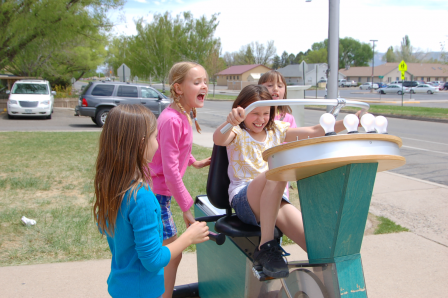 A Durango Girl Scout Troop explored the Solar Roller.
A Durango Girl Scout Troop explored the Solar Roller. 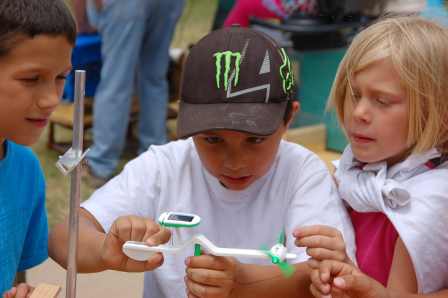 Students participated in the Montage of Circuits Field Trip
Students participated in the Montage of Circuits Field Trip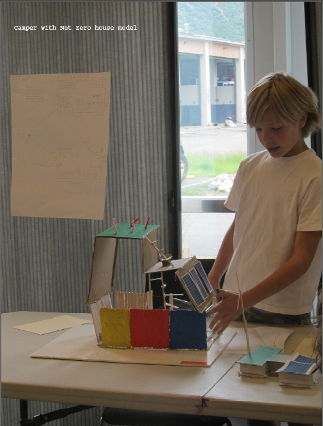 Architecture + Design Camp students at the Durango Discovery Museum built a Net Zero house model.
Architecture + Design Camp students at the Durango Discovery Museum built a Net Zero house model.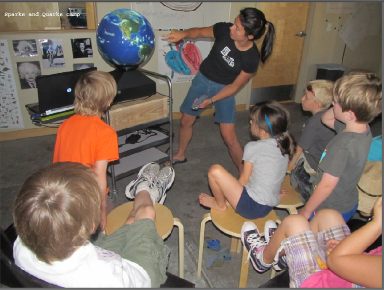 Sparks and Quarks Camp students at the Durango Discovery Museum learn using the Portable Planet multimedia globe.
Sparks and Quarks Camp students at the Durango Discovery Museum learn using the Portable Planet multimedia globe.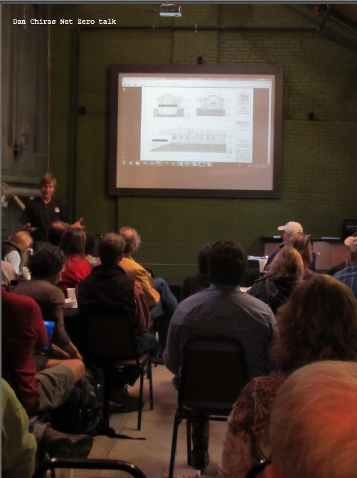 Dan Chiras gives a talk at the Durango Discovery Museum about net zero energy building.
Dan Chiras gives a talk at the Durango Discovery Museum about net zero energy building.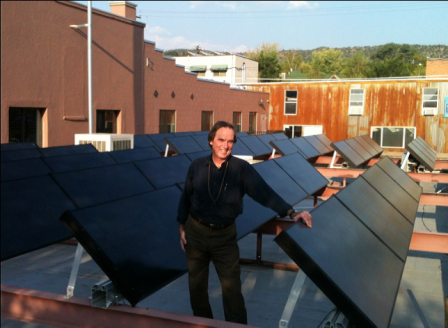 Solar panels on an RSBP coffee shop.
Solar panels on an RSBP coffee shop.